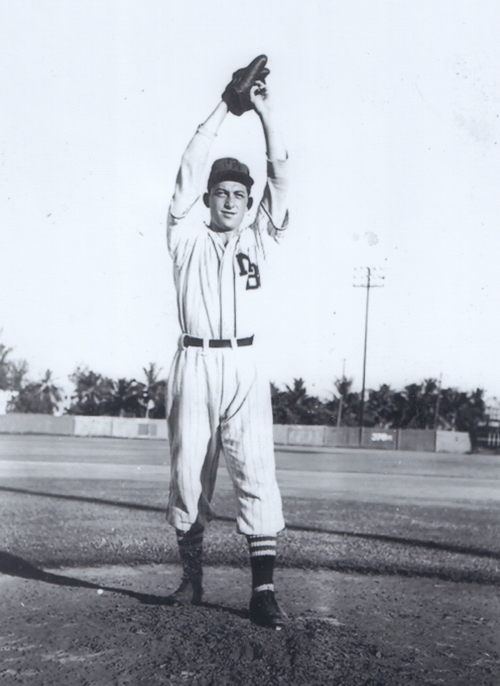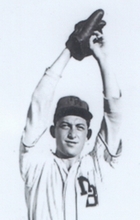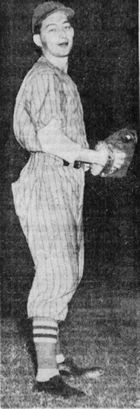Milt Rosenstein
| Date and Place of Birth: | June 20, 1920 Hunter, NY |
| Date and Place of Death: | November 28, 1944 Leyte, The Philippines |
| Baseball Experience: | Minor League |
| Position: | Pitcher |
| Rank: | Staff Sergeant |
| Military Unit: | 126th Infantry Regiment, 32nd Infantry Division US Army |
| Area Served: | Pacific Theater of Operations |
Milton “Rosey” Rosenstein was born on June 20, 1920 in Hunter, New
York. The son of Mr. and Mrs. Isidore Rosenstein, Jewish immigrants from
Russia, he grew up in Ellenville, New York, a village approximately 90
miles northwest of New York City in the Rondout Valley, at the eastern
base of the Catskill Mountains.
Rosenstein starred in baseball and basketball at Ellenville High School,
and went on to play amateur baseball during the summer of 1940 with
Saugerties A.C. The team played its home games at Cantine Memorial Field
in Saugerties (about 40 miles northwest of Ellenville on the Hudson
River), and Rosenstein – a 6-foot, 187-pound left-hander – was the ace
of the staff along with burly right-hander Eddie Wallace. At a time when
town baseball was a big attraction, Saugerties A.C. played in front of
good-sized crowds against opponents like the Hudson Whalers, General
Electrics, Kingston Recreations and the Pittsfield Pros. They also
regularly played traveling Negro teams such as the New York Black
Yankees, Detroit Clowns and Homestead Greys. On August 10, 1940,
Rosenstein pitched Saugerties A.C. to a 2-1 win over the inmates at Sing
Sing Prison. Allowing just four hits, the 20-year-old struck out 13.
In 1941, Rosenstein signed with the Miami Beach Flamingos of the Class D
Florida East Coast League. The Flamingos were managed by Max Rosenfeld,
who had briefly played as an outfielder with the Brooklyn Dodgers in the
early 1930s. Aged 38, Rosenfeld was also playing in the outfield for the
Flamingos and was in the outer pastures on many occasions as Milt
Rosenstein compiled a team leading 20-12 won-loss record, a superb 2.63
ERA and a league-leading 238 strikeouts.
On June 11, after having struck out 15 Miami Wahoos batters the night
before, he hurled two hitless innings to close the game for the Florida
East Coast League All-Stars against the Fort Pierce Bombers, albeit in a
losing cause.
The Flamingos, helped by future major leaguer Gene Bearden’s 17 wins
(Bearden had been the ace of the Flamingos’ staff the previous year with
an 18-10 record), finished second in the league standings just three
games behind the West Palm Beach Indians. They beat the Fort Pierce
Bombers in four games in the first round of the playoffs, and then
clinched the league championship beating the Indians in six games.
Rosenstein hurled a 5-0 three-hitter in the second game on September 11,
made a ninth-inning relief appearance the following day, and made his
final appearance of the season in the fifth game before a record crowd
of 1,203 at Flamingo Park on September 14. Rosenstein pitched six
innings in that contest and was relieved by Jack Embler who claimed the
6-5 win in 11 innings.
In just one season as a professional ballplayer, Milt Rosenstein was a
20-game winner, a circuit strike out leader and a star performer on a
league championship team. The Flamingos had received interest in the
young hurler from the New York Yankees and New York Giants, and, on December 5, 1941, it was announced that he
had been purchased by the Atlanta Crackers, pennant winners of the Class
A1 Southern Association, a team with whom the Flamingos had a working
agreement.
The young hurlers future looked extremely bright, but on March 17, 1942,
his baseball career came to an abrupt halt with a call from Uncle Sam.
He entered military service with the U.S. Army at Camp Blanding, near
Jacksonville, Florida, and later that year was stationed in California
where he attained the rank of corporal.
In December 1942, Rosenstein returned home to Ellenville on furlough to
spend a few days with his parents. It may have been the last time he was
home as he was later assigned to the 126th Infantry Regiment of the 32nd
Infantry Division in the Pacific Theater.
In October 1944, 24-year-old Rosenstein – now a staff sergeant – was
heading for the island of Leyte, part of the Visayan Islands in the
central Philippines, where the Allied campaign was launched for the
recapture and liberation of the Philippines.
The 32nd Infantry Division landed at Leyte on November 14, and went into
action along the Pinamopoan-Ormoc highway. Two days later they relieved
the 24th Infantry Division at Breakneck Ridge and captured the town of
Limon in bitter hand-to-hand combat against the Japanese. In his last
letter home he wrote that he had just gotten out of sick bay and, "They
wanted to send me home, but, I can't leave my buddies. We're so short
handed. Please forgive me. I volunteered to stay".
On November 28, 1944, little more than three years after hurling the
Miami Beach Flamingos to victory, Rosenstein was seriously wounded in
action and died later that day. He was posthumously awarded the Silver
Star for gallantry.
On September 8, 1946, a special service was held between games of a
double header between the Atlanta Crackers and the Mobile Bears, with a
plaque unveilled at the rear of the grandstand of Ponce de Leon Park to
honor the five Cracker players who made the ultimate sacrifice in World
War II - Milt Rosenstein, Troy Furr,
Frank Haggerty,
Duck McKee and
James Stewart.
Milt Rosenstein’s body was returned home to Ellenville, New York in
1949. Services were held at the Hebrew Aid Synagogue on February 3, with
Rabbi Jacob I. Nislick officiating. He was buried, with full military
honors, at the Hebrew Aid Society Cemetery in nearby Wawarsing, New York.
|
Year |
Team |
League |
Class |
G |
IP |
ER |
BB |
SO |
W |
L |
ERA |
| 1941 | Miami Beach | Florida East Coast | D | 40 | 267 | 78 | 74 | 238 | 20 | 12 | 2.63 |

Thanks to Astrid van Erp and Justin Kodner for help with photos and information for this biography.
Date Added February 13, 2011 Updated March 14, 2020
Baseball's Greatest Sacrifice is associated with Baseball Almanac
Baseball's Greatest Sacrifice is proud to be sponsored by




